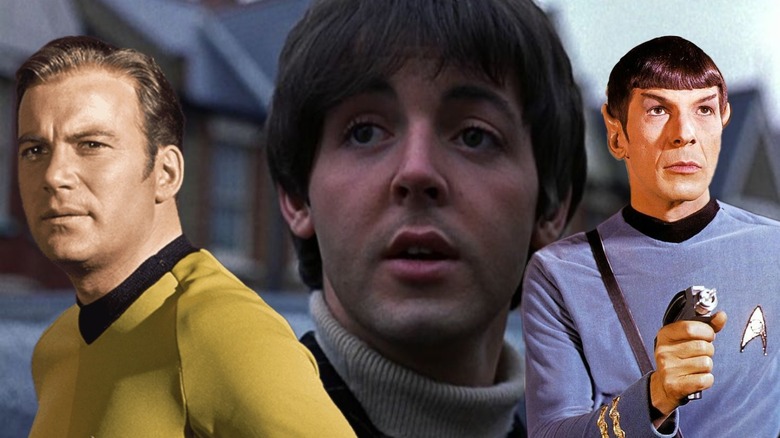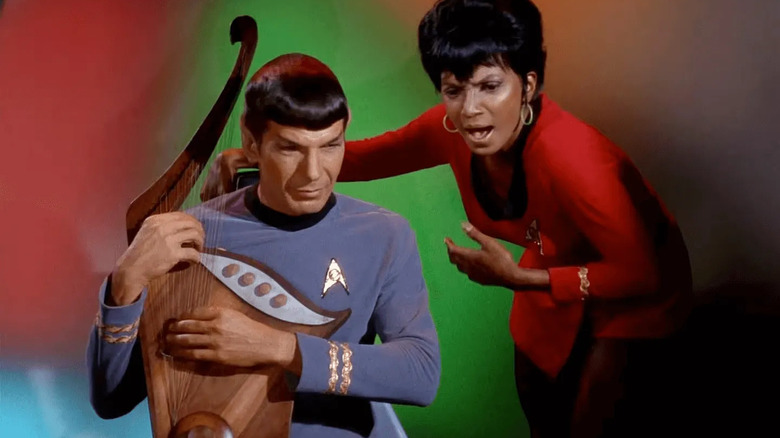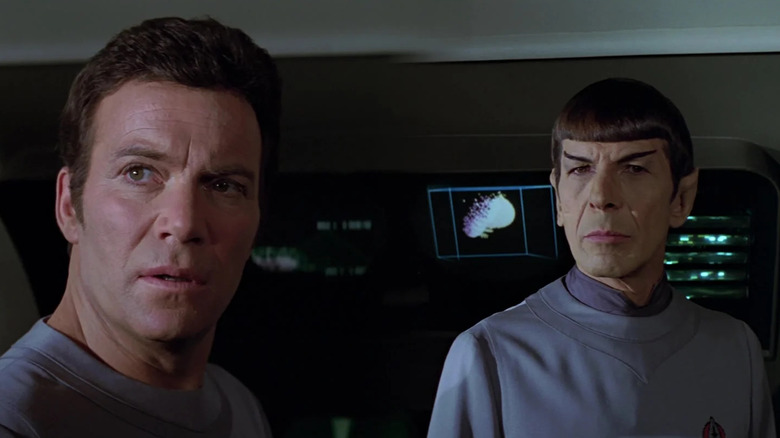Star Trek's Gene Roddenberry Teamed Up With Paul McCartney For An Unseen Project
After "Star Trek" was canceled in 1969, show creator Gene Roddenberry was dismayed. The series was hard-fought, but the ratings were never stellar during its initial run. Indeed, CBS was going to cancel the show at the end of its second season, but a massive letter-writing campaign kept it going for another year. "Star Trek," as most Trekkies know, didn't really its massive audience for a few years, after the series had been put into eternal syndication. Only then did fans start flocking to the show in earnest. It wouldn't be until 1972 that the first "Star Trek" convention would be held.
Roddenberry wasn't content to rest on his growing laurels, however, and tried out a few projects in the early 1970s, hoping to further explore his sci-fi interests. He loved to preach a philosophy of pacifism, as well as larger sci-fi themes about humanity's place in the cosmos ("2001: A Space Odyssey" came out in 1968, so it was also likely on his mind). In 1973, he created "Genesis II," a dystopian series about an underground tribe of pacifists and the modern man who was cryogenically unfrozen into their world. Then, in 1974, Roddenberry created "The Questor Tapes," a series about an android looking for its creator. Neither made it past the pilot episode.
In the oral history book "The Fifty-Year Mission: The Complete, Uncensored, Unauthorized Oral History of Star Trek: The First 25 Years," edited by Mark A. Altman and Edward Gross, Roddenberry's longtime girlfriend Susan Sackett recalled an additional Roddenberry project that never saw the light of day ... and it sounds wild. It seems that Paul McCartney, fronting his band Wings at the time, approached Roddenberry about a musical sci-fi project. McCartney was a Trekkie, so Roddenberry was his man.
Admiral Paul McCartney
Very little information exists about the Roddenberry/McCartney collaboration, likely because very little came of it. The story presumably ended shortly after the two men met for the first time and discussed their ideas, only for them to vanish after a single draft, like so many Hollywood projects before it. It sounded like McCartney wanted to produce a sci-fi feature film about musicians from outer space, but wanted Roddenberry to write it. There was no title, as Sackett recalled. She also knew that Roddenberry only accepted some work from McCartney out of financial desperation. In her own words:
"I have no idea whatever happened to that [project]. It's probably stuck in a file, like the end of 'Raiders of the Lost Ark.' Paul contacted him and was a 'Star Trek' fan. He invited us to a concert, which was great, and we met backstage. Paul hired Gene to write a story about the band and it was a crazy story. Paul gave him an outline and Gene was supposed to do something with it. It was bands from outer space and they were having a competition. Gene was open to things at this point; 'Star Trek' wasn't happening and he wasn't getting his scripts produced, but he had a family to feed."
From the sound of it, Roddenberry wasn't a huge Beatles fan, or was, at the very least, only passingly familiar with their music. The Wings concert he and Sackett attended was likely just to get to meet the singer backstage.
When Star Trek picked up again
Sackett continued:
"Gene began working on it and it was about the time they started talking about bringing back 'Trek', so he never got to complete anything for Paul."
And that's the last anyone heard about it. McCartney doesn't seem to have gone on record with his brief collaboration with Roddenberry, and his sci-fi band competition movie never came to pass under anyone else's auspices.
As "Star Trek" reruns persisted, and "Star Trek" conventions became more common, a new interest in the series was reignited. Trekkies can likely tell you all about "Star Trek: Phase II," the follow-up series that Roddenberry started to work on in the mid-1970s. Several scripts were written for "Phase II," and Roddenberry was poised to take control of his beloved sci-fi property again. "Phase II," however, began to expand in the eyes of Paramount, and many of its ideas eventually grew into "Star Trek: The Motion Picture" in 1979.
Because "Star Trek" takes place in the future, it tended to eschew modern popular culture, so Roddenberry never licensed any Beatles or Wings music for his franchise. From the sound of it, Roddenberry and McCartney didn't become friends or colleague. It seems that they merely met once. Now fans all over the world can merrily postulate on what might have been. Personally, I'm already picturing "Yellow Submarine" in space.
Roddenberry passed away in 1991, a few years into his beloved "Star Trek" continuation, "Star Trek: The Next Generation." Paul McCartney, despite what all the Beatles backward masking might have you believe, is actually still alive and touring at age 82.


